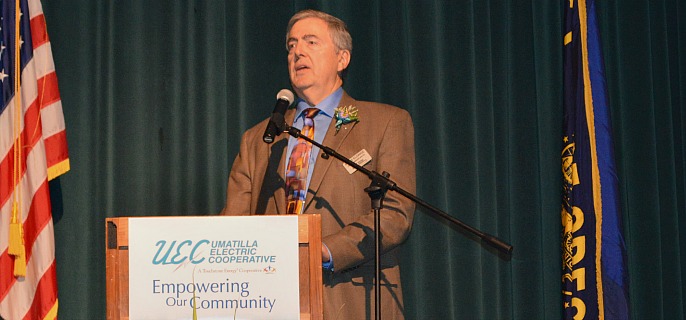
NEONOW FILE PHOTO
[quote style=”2″]Steve Eldrige Stepping Down After 4-Plus Decades[/quote]
I grew up here. It’s been the blessing of a lifetime to watch from a front-row seat how our community has grown over my 44 years at Umatilla Electric Cooperative (UEC).
When I started as UEC’s engineer, fresh out of Oregon State University in 1972 with an Electrical Engineering degree, irrigated agriculture was changing the landscape. New farm operations were turning the desert (primarily home to sagebrush and jackrabbits when I was growing up) into green circles of potatoes and other valuable crops.
Completion of John Day Dam and creation of Lake Umatilla opened the door to innovators like Mac McClannahan and his partner Ray Dunn who founded Oregon Potato and proved the potential of irrigated agriculture in our region. Powering irrigation pumps helped spur UEC investments in expanded plant and equipment, including Westland and Coyote Springs substations.

PHOTO COURTESY OF UEC
By 1981, UEC’s wholesale rate had been raised to 0.85 cents/kWh (just under 1 cent). The residential rate was now 2.27 cents. In response to unprecedented agriculturally-based growth in the area, UEC plant value had more than doubled again, revenues had tripled and system demand had increased by 50 percent, to 178 megawatts and another 300 miles of new power lines had been built. As a young engineer, I had joined UEC at a perfect time to enjoy the challenges of helping to facilitate the rapid expansion, development of new facilities and unparalleled growth. I had the opportunity to work on all aspects of support projects that a growing electric distribution utility needed.
But 1983 brought painful reversal of fortunes. The Northwest power world almost collapsed due to cost overruns, delays and the bond default of the Washington Public Power Supply System (WPPSS). All of this occurred in the midst of a national economy that was struggling to cope with oil embargoes and interest rates of 18 percent.
UEC’s growth in plant value flattened during this period, 30 percent of irrigation sales stopped, 45 percent of electric heat switched to wood heat and industrial food processors reduced their electric use by more than 50 percent. Retail rates continued to climb as more revenue was required to pay the increasing wholesale power bill. The only employee layoff in UEC’s history occurred in this period. In the end, as a result of this region-wide catastrophe, UEC paid a special assessment of $5.2 million to WPPSS and saw its wholesale power rates double. Kilowatt per hour sales declined for the first time in UEC’s history. Seventeen years would pass before UEC sales of electricity surpassed those of 1981.

PHOTO COURTEY OF UEC
UEC is now the largest rural electric cooperative in 10 western states, encompassing Hawaii and Alaska, the Northwest and Southwest, and California, in the amount of power sold.
UEC’s rapid growth today reflects the continued farm, food processing and industrial expansion in our community. UEC’s relatively low-cost power is a major economic asset. Our role in growing the regional economy is to partner with others – like the Port of Morrow and the Port of Umatilla that serve as the economic engines for the region.
It’s been my privilege to serve UEC as General Manager. The high points I experienced as a young engineer have been more than matched by the opportunities I’ve had while serving as General Manager. I’m proud of UEC’s role in helping to create Hermiston Energy Services, Oregon’s first municipal electric utility organized in more than 50 years. Today, HES customers save a collective $1 million each year on their electric bills compared to costs if they were still being served by an investor-owned utility.
UEC also helped form Eastern Oregon Telecom to give our area hometown phone and internet services that rival and surpass those of huge nationwide telecoms. The opportunity to serve on the board of Lightspeed Networks (LSN), founded in 2005 by a consortium of electric cooperatives that included Umatilla Electric with the goal of bringing better data communication service to rural Oregon and improved broadband in urban areas, is something I am especially proud of. Today, the services provided by LSN are helping rural areas like ours to compete and grow, strengthening our economy and job opportunities.
Among the community boards I served on, I especially value being part of Good Shepherd Health Care System’s (GSHCS) Board of Trustees. A “not-for-profit” facility, with foundational roots in the joint efforts of citizens in the local community, GSHCS strives to stay focused on its mission to meet the needs of local residents, providing compassionate, high quality and accessible health care, and promoting a healthy community.
My greatest blessing of all is family. Kathy (Carollo) Eldrige and I will celebrate our 44th anniversary this June. Five children – Jason, Jeff, Kevin, Sarah, Jessica – and a growing number of grandchildren (six so far with number seven to grace our family this fall!), give us much to appreciate and enjoy in retirement.
As I look back on these 44 years, what makes me most proud is that I have spent my career as part of a Cooperative. UEC’s strength is rooted in the cooperative model – a model that has worked exceptionally well for the Members of UEC.
UEC is a nonprofit company owned by those it serves. It operates solely for the benefit of its Members. Its genius is local control, but that could also be its Achilles Heel. Sustaining UEC’s success requires three things: 1) maintaining Members’ trust; 2) continued good governance; and 3) committed employees who understand that their role is to serve Members’ needs. I have been blessed to have experienced all three during my tenure.
Sincerely,
Steve Eldrige
UEC General Manager/CEO










